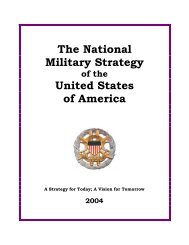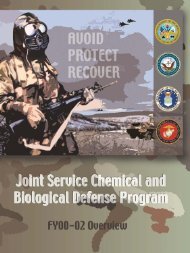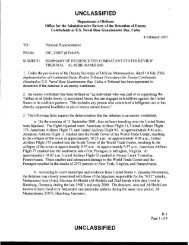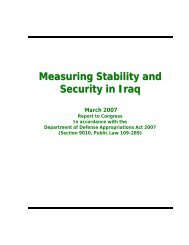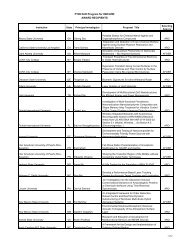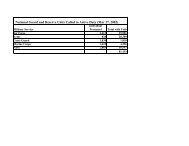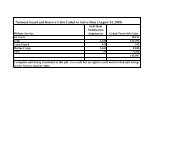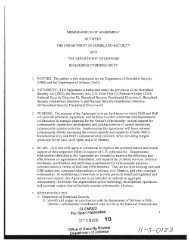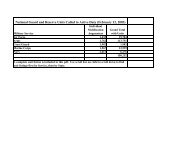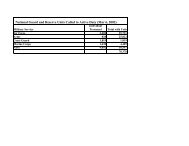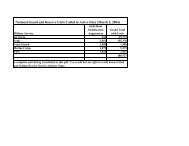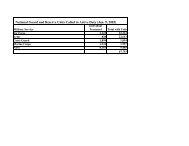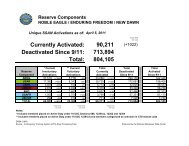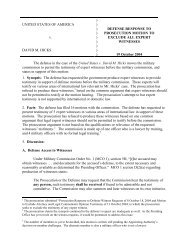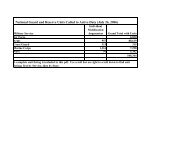Report - United States Department of Defense
Report - United States Department of Defense
Report - United States Department of Defense
You also want an ePaper? Increase the reach of your titles
YUMPU automatically turns print PDFs into web optimized ePapers that Google loves.
UNCLASSIFIED<br />
review committee rejected because the bidder failed to meet “criteria minimums as specified in<br />
Expression <strong>of</strong> Interest (EOI) and tender documents.” In a brief press conference, MoF Director<br />
General for Treasury Aqa and Da Afghanistan Bank Governor Delawari announced the rejection<br />
<strong>of</strong> the bids and outlined the options for the near future: to re-advertise; to sell to an interested<br />
bank following a one-to-one negotiation; or to liquidate the bank.<br />
On March 5, 2013, the Kabul Bank Special Tribunal convicted former Kabul Bank Chairman<br />
Shirkan Farnood and former Kabul Bank CEO Khalilullah Ferozi <strong>of</strong> “breach <strong>of</strong> trust,” and each<br />
was sentenced to five years in prison. They were fined a combined total <strong>of</strong> more than $800<br />
million. Farnood and Ferozi were acquitted, however, <strong>of</strong> more serious charges <strong>of</strong> embezzlement,<br />
forgery, and money-laundering, and thus are under no real legal obligation to pay back fines<br />
imposed by the Special Tribunal that handled the case. The other charges would have carried<br />
longer prison terms and increased the possibilities <strong>of</strong> enforcing fines and recovering assets held<br />
abroad. Nineteen other defendants, who were low-level Kabul Bank employees or Central Bank<br />
regulators, were also found guilty <strong>of</strong> misusing <strong>of</strong>ficial authority and failure to inform relevant<br />
authorities and received fines and/or prison sentences. Given the implications <strong>of</strong> these sentences,<br />
Afghan prosecutors have appealed the verdict and are prepared to seek harsher sentences.<br />
A key indicator <strong>of</strong> the Tokyo Mutual Accountability Framework calls for asset recovery and<br />
legal accountability for those responsible for the crisis. The next steps in the process will<br />
address how government authority can be constituted to confiscate assets where they exist. The<br />
case led Afghans to seek technical advice in strengthening their banking laws, fiscal control, and<br />
the role <strong>of</strong> the Central Bank in supervising Afghanistan’s financial institutions.<br />
The Kabul Bank Crisis resulted in widespread loss <strong>of</strong> confidence in the banking sector and<br />
highlighted significant weaknesses in the industry. These weaknesses cover all significant areas<br />
<strong>of</strong> bank stewardship and will continue to require extensive reforms to address weak financial<br />
supervision, corruption, overexposure, and security concerns. Presently, the Banking Law and<br />
banking framework, which aim to strengthen central bank regulations, has been reviewed by the<br />
Council <strong>of</strong> Ministers and is now in Parliament for review. However, until corruption – and the<br />
perception <strong>of</strong> corruption – within the banking sector are addressed, public confidence in the<br />
Afghan banking system will remain deficient.<br />
3.7: COUNTER-CORRUPTION AND TRANSPARENCY<br />
The international community continues to press for significant anti- and counter-corruption<br />
reforms through “mutual accountability,” so that donor money is conditioned to specific actions<br />
by the Afghan ministries. ISAF is also engaged with the international community and the<br />
Afghan government to illustrate the need for a coherent system <strong>of</strong> laws, regulations, and <strong>of</strong>fices<br />
to ensure the country’s extractive industries are successful and operate in an environment <strong>of</strong><br />
transparency and accountability. However, effective progress remains elusive due to a range <strong>of</strong><br />
factors, including the deeply embedded nature <strong>of</strong> societal corruption, individual and group efforts<br />
to maximize wealth, and the ability and willingness <strong>of</strong> those in power to prevent effective<br />
investigations, arrests, prosecutions and punishments.<br />
143



